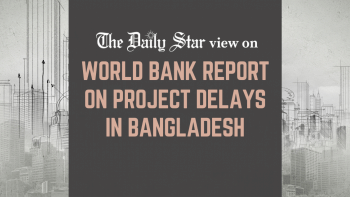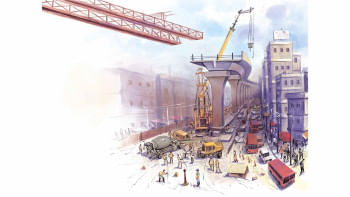Development cannot be focused on short-term gains only

The sorry state of affairs surrounding a bridge in Tangail serves as yet another reminder of the mismanagement and irregularities plaguing our development projects in general, and the negligence in ensuring quality control measures during construction in particular. According to a recent report, the 60-foot-long bridge, built five years ago, tilted under pressure from floodwaters just before its inauguration, and has been unusable ever since. This happened because of the use of sub-standard materials, poor workmanship and the lack of follow-through by both the contractor and the Ministry of Disaster Management and Relief, which had it built as part of a district-wide bridge development project during FY 2016-2017.
The question is, why hasn't it been reconstructed in all these years? Reportedly, after partially demolishing the structure, the contractor abandoned the work, citing the end of the project period. It also received only a fraction of the payment owed, indicating financial irregularities and potential corruption. Whatever happened to prolong the wait for a functional bridge, for the local communities, its consequences have been dire. The lack of a bridge has forced them to undertake longer journeys to reach crucial facilities such as the upazila health complex. Farmers in the area are unable to transport their agricultural produce efficiently, resulting in financial losses. Students are facing difficulties commuting to and from educational institutions, especially during the rainy season.
It was only a matter of logic that the project authorities would finish what they had set out to do, but they chose to ignore it in the absence of any institutional accountability. We have seen similar cases before, too. More commonly, you hear of infrastructure development projects being stalled halfway due to flawed designs and other reasons. These cases exemplify a broader pattern of development policy characterised by poor planning and execution as well as a lack of accountability. This has to change. A development policy cannot be solely focused on short-term gains, as was the case with the conception of bridge projects. It must strive for long-term sustainability, with the safety and welfare of local communities at the centre of it.
We, therefore, urge the Ministry of Disaster Management and Relief to immediately undertake repairs to make the Tangail bridge operational. There is also an urgent need for a comprehensive system of checks and balances in all development projects to ensure that public money is utilised efficiently. Effective supervision is a must for the timely and successful completion of all projects.


 For all latest news, follow The Daily Star's Google News channel.
For all latest news, follow The Daily Star's Google News channel. 








Comments